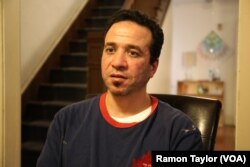A week after his release from immigration detention, Mohammed Gaber found a home at a halfway house in New Jersey.
He was one of five undocumented immigrants living at the Lighthouse run by First Friends, an immigrant advocacy group, which also helps residents find housing and jobs. All five were seeking asylum in the United States.
Gaber was seeking safety. “I came here, and I said, ‘If I stay here in the jail, that’s good for me,’” he told VOA.
Flags line the mantle over the living room fireplace, representing everyone who has lived in the halfway home. The walls are decorated with art work done by former residents.
A sign at the house’s front door says “This is a place of sanctuary. No trespassing. ICE (Immigration and Customs Enforcement) and CBP (Customs and Border Protection) agents are not authorized to enter premises.”
Afraid to go home
At Lighthouse, everyone cleans, cooks and works to pay for court fees while their cases are pending.
To Gaber, cleaning the backyard, watering the grass, and raking and sweeping leaves are more than chores, they mean freedom.
Gaber asked for U.S. asylum in 2015 when he claimed his wife’s family threatened to kill him after he was unfaithful to his spouse. His case was denied, and Gaber voluntarily traveled back to Egypt.
But in February, he was tortured and assaulted after his neighbor learned he was having a relationship with a transgender woman.
“They catch me and they bring to the police station. They whip me there. They beat me up too much,” Gaber said.
He said the beating was so severe he felt like he was in a “Deep sleep. I don’t know, like a coma.”
Gaber escaped. Gathering a few belongings, his passport, and some money. He fled to the U.S. Once he arrived, he requested asylum. He was taken to the Elizabeth Detention Center in New Jersey where he was detained for almost nine months.
Seeking safety
Like the residents at Lighthouse, any foreign national can file an asylum claim regardless of immigration status. Asylum seekers must prove they have a “credible fear of returning to their home country.”
The United States offers asylum or protection to people who are forced to flee their own countries because of persecution due to race, religion, nationality or political opinion.
Asylum seekers must apply within one year from the date of last arrival or show proof of an "exceptional" change based on extraordinary circumstances.
In June, the Associated Press reported about 70,000 asylum seekers, were being held at family detention centers. AP reported they are placed in a "highly intrusive intensive supervision program as they await court hearings on whether they can stay in the U.S." They are allowed out if they post a bond that ensures they will show up for court hearings.
The Trump administration released enforcement priorities last week that included tightening standards in the U.S. asylum system.
U.S. Attorney General Jeff Sessions has claimed the current asylum system is "subject to rampant abuse and fraud" and he called for tighter rules for people seeking asylum in the United States.
Sessions said current policies allow applicants to take advantage of a "broken" court system that is backlogged by about 600,000 cases nationwide, although not all of them are asylum cases.
Gaber is no longer a court case. And he is no longer at Lighthouse. He was granted asylum and has left to begin his new life as an American.
“I want stay here with peace. Peace inside me. … That’s it. I am feeling that here in America,” Gaber said.







